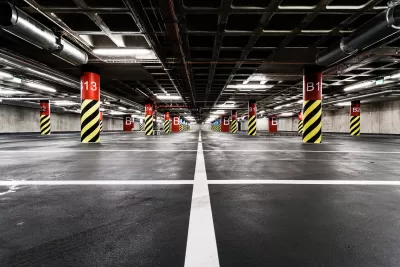A new study shows a significant reduction in housing construction costs in cities that have reduced or eliminated minimum parking requirements.

As more U.S. cities eliminate minimum parking requirements as part of an effort to boost housing supply and affordability, a new white paper from the Rutgers Center for Real Estate assesses the impact of parking reforms on residential development, writes Maddy McCarty in BisNow.
According to the paper, “Any reduction in mandated parking requirements for residential developments will lower initial construction costs and decrease ongoing operating costs, which will effectively allow for the reduction of rents.”
McCarty adds that “The Rutgers study found that if the body governing New Jersey’s parking requirements reduced the standard by just a half-car per unit, average rents in the state should fall by nearly 4%, all else holding equal.”
The article highlights examples from around the country, revealing how much money was saved on specific housing projects thanks to reduced parking requirements. A standalone parking structure costs roughly $28,000 per spot, on average. “In Minneapolis, the cost of new studio apartments, previously averaging $1,200 per month, went down to less than $1K per month in complexes where parking minimums were waived.”
Although parking reform isn’t a one-size-fits-all solution—“parking is driven by the demographic and the needs”—the study shows that letting developers build parking based on demand rather than arbitrary requirements can have a significant impact on construction costs and, in many cases, the number of housing units that get built.
FULL STORY: Over 1,400 Municipalities Have Altered Parking Minimums In Affordable Housing Push. Has It Worked?

Alabama: Trump Terminates Settlements for Black Communities Harmed By Raw Sewage
Trump deemed the landmark civil rights agreement “illegal DEI and environmental justice policy.”

Study: Maui’s Plan to Convert Vacation Rentals to Long-Term Housing Could Cause Nearly $1 Billion Economic Loss
The plan would reduce visitor accommodation by 25% resulting in 1,900 jobs lost.

Planetizen Federal Action Tracker
A weekly monitor of how Trump’s orders and actions are impacting planners and planning in America.

Waymo Gets Permission to Map SF’s Market Street
If allowed to operate on the traffic-restricted street, Waymo’s autonomous taxis would have a leg up over ride-hailing competitors — and counter the city’s efforts to grow bike and pedestrian on the thoroughfare.

Parklet Symposium Highlights the Success of Shared Spaces
Parklets got a boost during the Covid-19 pandemic, when the concept was translated to outdoor dining programs that offered restaurants a lifeline during the shutdown.

Federal Homelessness Agency Places Entire Staff on Leave
The U.S. Interagency Council on Homelessness is the only federal agency dedicated to preventing and ending homelessness.
Urban Design for Planners 1: Software Tools
This six-course series explores essential urban design concepts using open source software and equips planners with the tools they need to participate fully in the urban design process.
Planning for Universal Design
Learn the tools for implementing Universal Design in planning regulations.
Caltrans
Smith Gee Studio
Institute for Housing and Urban Development Studies (IHS)
City of Grandview
Harvard GSD Executive Education
Toledo-Lucas County Plan Commissions
Salt Lake City
NYU Wagner Graduate School of Public Service





























